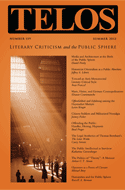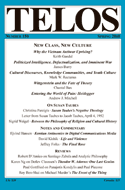By Arthur C. T. Strum · Thursday, July 26, 2012 Arthur C. T. Strum’s “The Politics of ‘Theory’ in a Late Twentieth-Century University: A Memoir” appears in Telos 159 (Summer 2012). Read the full version online at the Telos Online website, or purchase a print copy of the issue here.
 In this essay, I explore my own experience as an undergraduate of two formations. One of these formations might be called “liberal pedagogy,” by which I mean something which its practitioners do not in the rule consciously profess, but which underlies their everyday practice, in and out of the classroom. The other formation is what denizens of the American university have for the past thirty years commonly called “theory,” whose adherents tended to define themselves against what they saw and see as the self-deceptions of liberal thought. I contend, against both the “theorists” and the university’s liberal defenders, that liberal pedagogy is in fact deeply political—far more profound, politically, than most “theory,” which tends not to get very far beyond what it thinks it contests: the structuring prejudices of present-day civil society. But I also try to show that the inclination towards “theory” has its own political profundity—whose ultimate implications, however, are ambiguous. In this essay, I explore my own experience as an undergraduate of two formations. One of these formations might be called “liberal pedagogy,” by which I mean something which its practitioners do not in the rule consciously profess, but which underlies their everyday practice, in and out of the classroom. The other formation is what denizens of the American university have for the past thirty years commonly called “theory,” whose adherents tended to define themselves against what they saw and see as the self-deceptions of liberal thought. I contend, against both the “theorists” and the university’s liberal defenders, that liberal pedagogy is in fact deeply political—far more profound, politically, than most “theory,” which tends not to get very far beyond what it thinks it contests: the structuring prejudices of present-day civil society. But I also try to show that the inclination towards “theory” has its own political profundity—whose ultimate implications, however, are ambiguous.
Continue reading →
By Emelie Whiting · Thursday, December 8, 2011 As an occasional feature on TELOSscope, we highlight a past Telos article whose critical insights continue to illuminate our thinking and challenge our assumptions. Today, Emelie Whiting looks at Mark W. Rectanus’s “Performing Knowledge: Cultural Discourses, Knowledge Communities, and Youth Culture,” from Telos 150 (Spring 2010).
 Academic discourse in the twenty-first century has undergone profound transformations. With new methods of knowledge production and consumption brought about by an increase in electronic resources and databases as well as the advent of social networking, there have been widespread changes in scholarly publishing, centers of knowledge, and knowledge communities. In his article “Performing Knowledge: Cultural Discourses, Knowledge Communities, and Youth Culture,” Mark W. Rectanus provides a compelling look at the shift in the significance and acquisition of knowledge resulting from changes in the publishing industry, literary reception, and access to different kinds of information as they stand in relation to a new “pedagogy of media”—a new way of teaching and learning in our technologically advanced age. Rectanus asserts that such developments require a revised conception of what it means to acquire knowledge as well as what constitutes scholarly knowledge. Academic discourse in the twenty-first century has undergone profound transformations. With new methods of knowledge production and consumption brought about by an increase in electronic resources and databases as well as the advent of social networking, there have been widespread changes in scholarly publishing, centers of knowledge, and knowledge communities. In his article “Performing Knowledge: Cultural Discourses, Knowledge Communities, and Youth Culture,” Mark W. Rectanus provides a compelling look at the shift in the significance and acquisition of knowledge resulting from changes in the publishing industry, literary reception, and access to different kinds of information as they stand in relation to a new “pedagogy of media”—a new way of teaching and learning in our technologically advanced age. Rectanus asserts that such developments require a revised conception of what it means to acquire knowledge as well as what constitutes scholarly knowledge.
Continue reading →
|
|
 In this essay, I explore my own experience as an undergraduate of two formations. One of these formations might be called “liberal pedagogy,” by which I mean something which its practitioners do not in the rule consciously profess, but which underlies their everyday practice, in and out of the classroom. The other formation is what denizens of the American university have for the past thirty years commonly called “theory,” whose adherents tended to define themselves against what they saw and see as the self-deceptions of liberal thought. I contend, against both the “theorists” and the university’s liberal defenders, that liberal pedagogy is in fact deeply political—far more profound, politically, than most “theory,” which tends not to get very far beyond what it thinks it contests: the structuring prejudices of present-day civil society. But I also try to show that the inclination towards “theory” has its own political profundity—whose ultimate implications, however, are ambiguous.
In this essay, I explore my own experience as an undergraduate of two formations. One of these formations might be called “liberal pedagogy,” by which I mean something which its practitioners do not in the rule consciously profess, but which underlies their everyday practice, in and out of the classroom. The other formation is what denizens of the American university have for the past thirty years commonly called “theory,” whose adherents tended to define themselves against what they saw and see as the self-deceptions of liberal thought. I contend, against both the “theorists” and the university’s liberal defenders, that liberal pedagogy is in fact deeply political—far more profound, politically, than most “theory,” which tends not to get very far beyond what it thinks it contests: the structuring prejudices of present-day civil society. But I also try to show that the inclination towards “theory” has its own political profundity—whose ultimate implications, however, are ambiguous.  Academic discourse in the twenty-first century has undergone profound transformations. With new methods of knowledge production and consumption brought about by an increase in electronic resources and databases as well as the advent of social networking, there have been widespread changes in scholarly publishing, centers of knowledge, and knowledge communities. In his article “Performing Knowledge: Cultural Discourses, Knowledge Communities, and Youth Culture,” Mark W. Rectanus provides a compelling look at the shift in the significance and acquisition of knowledge resulting from changes in the publishing industry, literary reception, and access to different kinds of information as they stand in relation to a new “pedagogy of media”—a new way of teaching and learning in our technologically advanced age. Rectanus asserts that such developments require a revised conception of what it means to acquire knowledge as well as what constitutes scholarly knowledge.
Academic discourse in the twenty-first century has undergone profound transformations. With new methods of knowledge production and consumption brought about by an increase in electronic resources and databases as well as the advent of social networking, there have been widespread changes in scholarly publishing, centers of knowledge, and knowledge communities. In his article “Performing Knowledge: Cultural Discourses, Knowledge Communities, and Youth Culture,” Mark W. Rectanus provides a compelling look at the shift in the significance and acquisition of knowledge resulting from changes in the publishing industry, literary reception, and access to different kinds of information as they stand in relation to a new “pedagogy of media”—a new way of teaching and learning in our technologically advanced age. Rectanus asserts that such developments require a revised conception of what it means to acquire knowledge as well as what constitutes scholarly knowledge. 

